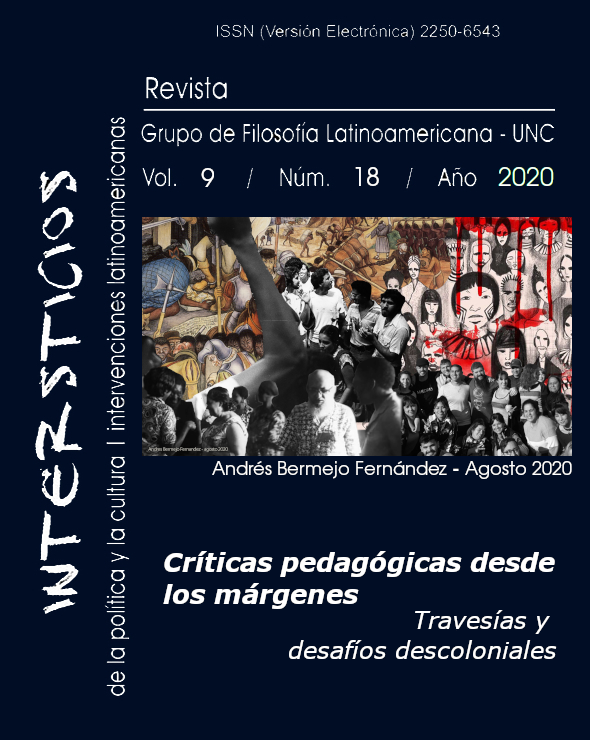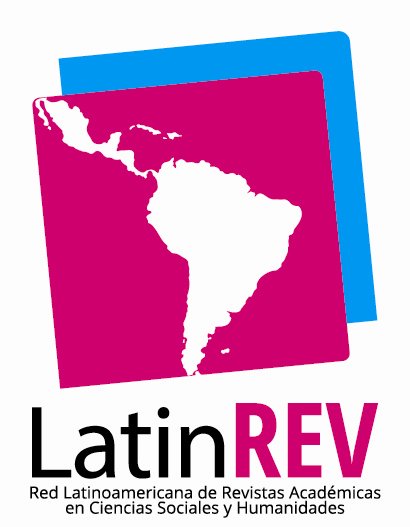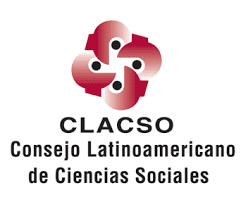Conditions of possibility for a shift in the modern colonial episteme of state Universities
Mestizas annotations in/with/from/for the South
Keywords:
University, Perceived Outstanding, Situation Limit, Limit Act, Unprecedentedly viableAbstract
In this essay I evaluate the possibility of producing a shift in the modern/colonial episteme that predominates in university classrooms in this part of the south, Wallmapu (Mapuche body/territory). Based on the categories perceived importance – limit situation – limit act – untested feasibility introduced in his Pedagogy of the Oppressed ([1970] 1985) and Pedagogy of Hope ([1992] 2018), Paulo Freire created a reflexive-constructive methodology that goes beyond the technical dimensions of knowledge construction. It rather represents a way for us to see ourselves as social beings committed to transforming our reality. In this work I share notes taken from conversations with various sources, and discuss theoretical perspectives, poems, photographs and memories. Open to diverse elements, this essay seeks to bring together localized subjective and collective dimensions. The many theoretical-practical references meet the analytical demands of the process of re-thinking education, teaching and research. While of perceived importance, these practices are problematized in relation to the question of how the state University could become decolonized, and thus, in terms of the untested feasible, contribute to building up a community, strengthening the memories of the south in the construction of knowledge. From a decolonial analysis approach, conceptual and poetic tools are included in order to examine, uncover and broaden our vision from the perspective of peripheral critical theories. Taking this position into account, I suggest the construction of a collective opportunity for the interchange and systematization of diverse experiences as a limit act. These experiences should be shared and rediscovered, promoting the removal of persistent hegemonic representations in order to stop producing only essence and absence.
Downloads
References
Bidaseca, K. (2016). Genealogías críticas de la colonialidad en América Latina, África, Oriente. Buenos Aires: CLACSO/IDAES-UNSAM.
_______ (2018). La Revolución será feminista o no será. La piel del arte feminista descolonial. Buenos Aires: Prometeo.
Didi-Huberman, G. (2009). La imagen superviviente. Historia del arte y tiempo de los fantasmas según Aby Warburg. Madrid: Abada.
Escobar, A. (2017). Autonomía y diseño. La realización de lo comunal. Buenos Aires: Tinta Limón.
Fanon, F. (2009). Piel negra, máscaras blancas. Madrid: Akal.
Fernández Mouján, I. (2014). Miradas descoloniales en la educación. Intersticios De La política Y La Cultura. Intervenciones Latinoamericanas, 3 (6), 5-19. Recuperado de https://goo.su/2Edf2eDF
________ (2016). Elogio de Paulo Freire. Sus dimensiones ética, política y cultural. Buenos Aires: Novedades Educativas.
________ (2018). La idea de liberación en Paulo Freire. Saberes y prácticas. Revista De Filosofía y Educación, 3, 1-17. Recuperado de https://goo.su/2eDf
Fielbaum, A. y Errázuriz Cruz, R. (2014). El entre-lugar como un pensamiento del riesgo. Entrevista a Silvano Santiago. Revista Chilena de Literatura, 88: 309-318. Recuperado de https://goo.su/2edF
Freire, P. (1985). Pedagogía del Oprimido. Buenos Aires: Siglo XXI.
_______ (1997). Pedagogía de la Autonomía. Saberes necesarios para la práctica educativa. México: Siglo XXI.
_______ (2018). Pedagogía de la Esperanza. Un reencuentro con la pedagogía del oprimido. Buenos Aires: Siglo XXI.
Gandarilla Salgado, J. y Ortega Reyna, J. (2017). Todas las cicatrices: hacia una fenomenología de lo colonial en Frantz Fanon. Revista Intersticios de la política y la cultura. Intervenciones Latinoamericanas, 6 (12), 31-65. Recuperado de https://goo.su/2edf
Glissant, E. (2006). Tratado del Todo-Mundo. Barcelona: El Cobre.
_______ (2017). Poética de la relación, Bernal (Buenos Aires): Universidad Nacional de Quilmes.
Grüner, E. (2016). Teoría crítica y contra-Modernidad. El color negro: de cómo una singularidad histórica deviene en dialéctica crítica para “nuestra América” y algunas modestas proposiciones finales. En: Gandarilla, J. G. (coord.), La crítica en el margen. Hacia una cartografía conceptual para rediscutir la modernidad. (19-60). México: Akal.
_______ (2017). Iconografías malditas. Imágenes desencantadas. Hacia una política “warburgiana” en la antropología del arte. Buenos Aires: EUFyL.
Meneses, M. P. (2016). A questão negra entre continentes:possibilidades de tradução interculturala partir das práticas de luta?. Sociologias, 18 (43), 176-206. Recuperado en http://dx.doi.org/10.1590/15174522-018004307
Mudimbe, V. Y. (1988). The Invention of Africa. Gnosis, Philosophy and the Order of Knowledge. Bloomington: University of Indiana Press.
Pérez Aguirre, A. M.; Ramírez, P.; Zorzoli, P.; Oviedo, R. D.; Vai, D.; Lopardo, G.; (…) Pozas, D. (2002). Didáctica de las Prácticas Escolares Cotidianas (DIPEC). Preguntas a compartir con docentes de todos los niveles. Neuquén: Manuscritos.
Ramírez, P. (2020). Tesis doctoral: “Una didáctica intercultural en la formación de docentes universitarios. Condiciones de posibilidad en Furilofche warria Wallmapu mew”. Neuquén: Educo-Universidad Nacional del Comahue. ISBN 978-987-604-558-2. En proceso de edición.
Rinesi, E. (2019). Restos y desechos. El estatuto de lo residual en la política. Buenos Aires: Caterva.
Rufer, M. (2018). La memoria como profanación y como pérdida: comunidad, patrimonio y museos en contextos poscoloniales. Revista A Contra corriente, 15 (2), 149-166. Recuperado de https://goo.su/2edE
Santos, B. (2017). La traducción intercultural. En: Justicia entre saberes: Epistemologías del Sur contra el epistemicidio. (263-288). Madrid: Morata.
_______ (2018). Introducción a las epistemologías del sur. En: Construyendo las Epistemologías del Sur - Para un pensamiento alternativo de alternativas. (25-61). Buenos Aires: CLACSO.
Spinoza, B. (2007). Ética. Madrid: Tecnos.
Downloads
Published
How to Cite
Issue
Section
License

This work is licensed under a Creative Commons Attribution-NonCommercial-ShareAlike 4.0 International License.
Authors who have publications with this journal agree to the following terms:
a. Authors will retain their copyright and grant the journal the right of first publication of their work, which will simultaneously be subject to the Creative Commons Attribution License that allows third parties to share the work as long as its author and first publication in this journal are indicated.
b. Authors may adopt other non-exclusive license agreements for distribution of the published version of the work (e.g., deposit it in an institutional telematic archive or publish it in a monographic volume) as long as the initial publication in this journal is indicated.
c. Authors are allowed and encouraged to disseminate their work through the Internet (e.g., in institutional telematic archives or on their web page) after the publication process, which may produce interesting exchanges and increase citations of the published work (see The effect of open access).










